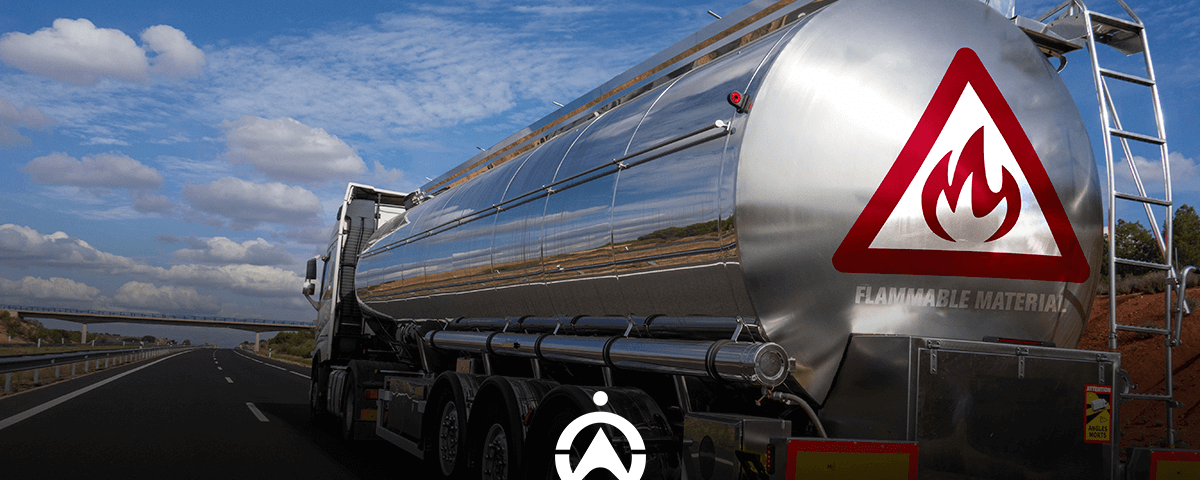Stop the Dangers of Hazardous Waste with Powerful Waste Management Fleet Software
We always see delivery trucks and other vehicles bustling through cities, transporting everything from groceries to furniture. But what about the things we don’t always see, things that can harm us?
Hazardous materials in transit can be extremely harmful to you, me and a business if not handled carefully. That’s where hazardous waste management comes in.
Read on to discover smarter ways of managing and ensuring your waste materials are always safely handled.
Hazardous waste and its impact on society
We all know waste is a part of life, but when it comes to hazardous materials, things get a lot more serious.
Hazardous waste can be anything from used batteries and paint to medical waste and even certain household cleaning products. These materials seriously threaten our health and the environment if not handled properly.
So, how do we ensure that hazardous waste is transported safely from its source to treatment facilities without causing harm?
The answer, with good fleet management.
Fleet management systems use technology and built-in expertise to ensure waste transportation is efficient, safe, and compliant with regulations.
Understanding waste classification for safe and responsible handling
Knowing what kind of waste your company handles isn’t just a box-ticking exercise; it’s crucial for ensuring the safety of everyone involved.
Accurately characterising waste allows you to implement the most suitable safety measures for your drivers and employees, preventing accidents and potential harm to your team.
Why is proper waste classification crucial?
- Ensuring Safety: Different waste types require specific handling protocols to protect your drivers, personnel at waste facilities, and the environment. Misidentification can lead to exposure to harmful toxins, fires, or even explosions.
- Optimising Efficiency: Knowing the type of waste allows you to assign the appropriate vehicles and equipment to your fleet. This ensures efficient transportation and avoids unnecessary costs associated with over- or under-equipped vehicles.
- Regulatory Compliance: Failing to properly classify and handle hazardous waste can result in hefty fines, legal repercussions, and reputational damage. Different regulations govern the transportation and disposal of various waste categories, and adherence is essential.
Common types of hazardous waste
This encompasses any waste that poses a potential threat to human health or the environment due to its physical, chemical, or biological properties.
- Ignitability: These wastes can easily catch fire or cause fires when exposed to heat, sparks, or flames.- Flammable liquids: gasoline, paint thinner, solvents
– Flammable solids: lithium batteries, fireworks, magnesium
– Flammable gases: propane, butane, natural gas
- Reactive: These wastes can undergo violent or dangerous reactions, like exploding when mixed with other wastes or exposed to air or water.- Explosives: ammunition, fireworks, blasting agents
– Organic peroxides: used in curing plastics and resins
– Unstable chemicals: nitroglycerin, picric acid
- Corrosivity: These are prone to rusting or decomposing and can eat away at or damage living tissue and materials like plastic and metal.- Acids: sulfuric acid, hydrochloric acid, muriatic acid
– Bases: sodium hydroxide, potassium hydroxide, lye
– Oxidising agents: bleach, hydrogen peroxide, peroxides
- Toxicity: These materials can be poisonous to inhale and can cause serious health issues like cancer or organ damage to those exposed to them.- Heavy metals: lead, mercury, arsenic, chromium
– Pesticides: herbicides, insecticides, fungicides
– PCBs (polychlorinated biphenyls): used in coolants and lubricants
Although these are the recognised types, there are other waste materials that either don’t fit just one category or whose effects are different from what that category states.

The real-world risks of improper waste management
Hazardous waste isn’t just a buzzword; it’s a real concern with potentially devastating consequences.
Even minor oversights in handling and transporting waste can snowball into significant problems. If a truck carrying hazardous waste drives over a pothole and spills its contents, everyone around it would be at serious risk. Yikes!
Improper handling can create a domino effect, leading to these negative outcomes:
- Employee/human safety risks: Improper handling of hazardous waste, like chemicals or biohazard materials, can expose the public to toxins or pathogens that can have a negative or even deadly reaction, from respiratory problems and skin irritation to more serious illnesses like cancer.
- Environmental damage: During transportation, if hazardous waste containers are not secured properly or leak due to improper handling, they can contaminate the surrounding environment. The spills and leaks can contaminate soil and water resources, harming ecosystems and wildlife.
- Financial penalties: Improper waste management can lead to unexpected costs, such as clean-up efforts for spills and additional training for non-compliance issues.Failing to comply with regulations regarding hazardous waste, like proper waste classification and disposal procedures, can result in hefty fines, legal repercussions, and even licence suspension.
- Operational inefficiencies: In cases of improper waste classification, drivers might be forced to reroute to appropriate disposal facilities, leading to delays, impacting efficiency, and increasing fuel costs.
What is the best way to mitigate hazardous waste risks?
For a fleet manager, handling, using proper vehicles, and ensuring safety measures are practised when disposing and transporting harmful materials is a high priority. To try and prevent the negative outcomes listed above can be a stressful task to take on alone; thankfully, there are ways to prevent these scenarios — through efficient waste management.
Imagine your house. Every day, you create trash like leftover food, used tissues, and empty packaging. To keep your house clean and healthy, you need to manage this waste properly. Proper waste management is similar, but on a much bigger scale, applied to businesses, communities, and even entire countries.
It encompasses a range of activities aimed at reducing the environmental and health impacts of waste.
Waste collection: Collecting waste from households, businesses, and public areas using bins, dumpsters, or specialised collection vehicles.
Transportation: Transporting collected waste to processing facilities or disposal sites via waste management fleets, such as trucks or vans.
Processing: Processing waste through methods such as sorting, shredding, composting, or recycling to recover valuable materials and reduce the volume of waste sent to landfills.
Recycling: Separating and reprocessing waste materials like paper, plastic, glass, and metal to produce new products, conserving natural resources and reducing energy consumption.
Disposal: Safely disposing of non-recyclable or hazardous waste in landfills, incinerators, or other appropriate facilities to minimise environmental and health risks. To make this process flow more efficiently, companies need software to keep track of their waste transportation and handling.
5 Ways fleet management software assist the waste and recycling industries
Just like using apps that manage your finances or fitness, companies can use fleet management software to help with waste management. This software helps businesses in the waste management industry handle their operations more efficiently and effectively.
Fleet management specifically serves as a valuable tool in hazardous waste transportation by addressing several key challenges:
- Enhanced tracking and real-time visibility:
Real-time GPS tracking empowers fleet managers to precisely locate and monitor the movement of vehicles carrying hazardous materials. This allows them to ensure adherence to designated routes, minimising the risk of getting lost or deviating from safe pathways.Additionally, this real-time visibility facilitates swift response from managers in emergencies, enabling authorities to locate vehicles involved in accidents or unforeseen situations and quickly contain and handle the waste materials.
If a tanker truck transporting hazardous waste encounters unexpected traffic congestion on its designated route, the fleet manager or dispatcher can promptly reroute the vehicle through a less congested path, ensuring timely delivery while minimising the risk of accidents due to traffic delays.
- Proactive safety measures through sensor integration:
Hazardous materials are susceptible to spills and leaks during transportation, potentially causing significant environmental damage. Specialised sensors can monitor vital parameters like temperature, pressure and door opening. Any sudden changes in pre-defined actions can trigger immediate alerts, prompting swift intervention to prevent accidents and environmental contamination.After being alerted, managers can inform drivers to pull over and initiate safety measures and containment procedures, preventing the hazardous material from escaping and affecting the public.
- Empowering drivers with training and awareness:
Well-trained and informed drivers play a crucial role in ensuring the safe transportation of hazardous materials. Fleet management systems can provide managers with training modules and resources to properly educate their drivers about the specific risks associated with hazardous waste, safe driving practices, and emergency response procedures.After training, managers can issue a checklist of safety measures or conduct a thorough inspection as part of their pre-trip routine, so drivers follow their training when loading or transporting waste material to ensure the knowledge gained is practised regularly.
Taking actions like paying particular attention to the secure fastening of the hazardous waste containers and ensuring proper labelling and documentation are readily available. This continual awareness fosters a culture of safety and compliance among drivers.
- Simplifying regulatory compliance:
The regulations governing hazardous waste transportation are complex and constantly evolving. Failure to comply can result in significant fines and legal repercussions. Fleet management systems offer valuable tools and resources to assist companies in adhering to relevant regulations.The system automatically generates comprehensive reports on driver hours of service, vehicle inspections, and handled waste reporting, ensuring all necessary documentation is meticulously maintained and readily accessible for audits.
- Optimising costs and enhancing efficiency:
While essential for environmental protection, hazardous waste transportation can be a costly endeavour. Fleet management systems offer features that can optimise routes, minimise fuel consumption, and reduce wear and tear on vehicles, leading to substantial cost savings in the long run.This is done by analysing historical data, like previous routes taken and real-time traffic patterns, to present the most efficient route for a truck transporting hazardous waste. This not only reduces fuel consumption but also minimises the possibility of accidents due to time constraints when navigating congested roads.Keeping everyone safe is a team effort. While fleet management is a powerful tool, managers still need to ensure that their drivers and employees in contact with the waste material are well-trained in proper waste management and follow safety guidelines.
Together, they can make sure hazardous waste journeys are safe and responsible.
.png)
Benefits to reap from when using fleet management software for hazardous waste management
While traditional fleet management software offers many advantages, specific features and benefits cater directly to the unique needs of hazardous waste management:
- Accurate waste classification for safe management:
The fleet management software meticulously tracks every aspect of hazardous waste, such as origin, type, quantity, and disposal destination, ensuring thorough management until disposal.
- Ensures proper regulatory compliance:
By integrating data of regulatory requirements and industry standards, the software acts as a compliance ally, ensuring strict adherence to all regulations governing the handling and disposal of hazardous waste. This feature is important for avoiding legal complications and penalties.
- Streamlines the waste removal process:
The software optimises waste collection routes and schedules to maximise efficiency and minimise environmental impact. With the software’s capabilities, businesses can plan and execute the most efficient routes for hazardous waste pickups. This ensures timely and secure removal, aligning with regulatory timelines and safety standards.
- Fast and accurate data entry:
The software facilitates swift and precise data entry for all aspects related to hazardous waste. Using features like barcode scanning and electronic forms minimises errors and speeds up the information recording process, saving valuable time and resources for businesses.
Trust Cartrack’s software for seamless and sustainable waste management in your fleet
Building on the benefits listed above, Cartrack offers specific fleet management solutions that can be tailored to meet specific needs and further empower your waste management operations.
- Driver behaviour monitoring
Identify and address risky driving behaviours like harsh braking or speeding, promoting safe waste transportation practices.
- Route optimisation
Optimise routes based on factors like traffic, waste type, and pickup locations, minimising travel time, fuel consumption, and emissions.
- Geofencing and alerts
Set virtual boundaries around specific areas and receive alerts if your fleet vehicles enter or exit unauthorised zones, ensuring proper waste collection adherence.
- Driver ID tags
Be informed of each driver that operates your asset and actively deter unauthorised use of equipment and vehicles. This ensures the right driver with proper training is assigned to waste collection and disposal, enhancing safety and compliance in transporting hazardous materials.
- Vehicle maintenance
With preventative maintenance alerts, managers can monitor vehicle health and promptly address any mechanical issues that may cause breakdowns or waste material leaks. This proactive approach ensures safe and effective waste management operations.
- AI camera solution
Detect and prevent distracted driving behaviour events like phone use or fatigued driving that can cause accidents. With in-cabin audio alerts, drivers are notified and empowered to fix their driving behaviour to drive safely, ensuring a lower risk of potential accidents or waste material spillage.
How Cartrack helped Compass Medical Waste successfully manage their high-risk waste
Compass Medical Waste Services provides a professional healthcare risk waste management service specialising in the containment, collection, treatment, and disposal of healthcare risk waste in an environmentally responsible manner.
Managing healthcare waste is a highly regulated industry, and as a result, it is crucial to have the best traceability system in place. Compass Medical Waste chose Cartrack as a reliable partner to help track their waste, ensuring 100% compliance every mile of the way.
“We chose to partner with Cartrack because of the highly regulated industry that we operate in. In the healthcare risk-based environment, your waste needs to be tracked from cradle to grave. One of the major challenges in a distribution or logistics environment is the fact that driver behaviour needs to be monitored and managed. With Cartrack, the drivers can be monitored.
As you know, distribution is one of the major cost factors in any operation, and we would like to have more control over it. With Cartrack, we found that we got the necessary controls and risk management in place.”
Jan van den Berg, Sales Director, Compass Medical Waste Services
Navigate hazardous waste management confidently with Cartrack
Choose a company that always puts safety and efficiency first, especially when it comes to hazardous waste management. Elevate your waste operations with Cartrack’s industry-leading fleet management solutions.
Contact Cartrack and start safeguarding your employees today.



